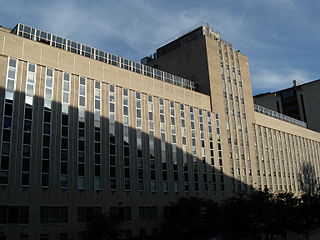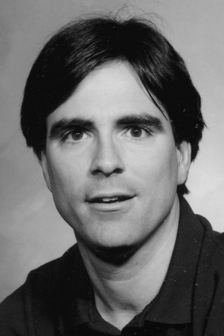
Carnegie Mellon University (CMU) is a private research university in Pittsburgh, Pennsylvania. The institution was originally established in 1900 by Andrew Carnegie as the Carnegie Technical Schools. In 1912, it became the Carnegie Institute of Technology and began granting four-year degrees. In 1967, it became the current-day Carnegie Mellon University through its merger with the Mellon Institute of Industrial Research, founded in 1913 by Andrew Mellon and Richard B. Mellon and formerly a part of the University of Pittsburgh.

The Heinz College of Information Systems and Public Policy, also known as Heinz College, is the public policy and information college of Carnegie Mellon University in Pittsburgh, Pennsylvania. It consists of the School of Information Systems and Management and the School of Public Policy and Management. The college is named after CMU's former instructor and the later U.S. Senator John Heinz from Pennsylvania.

The School of Computer Science (SCS) at Carnegie Mellon University in Pittsburgh, Pennsylvania, US is a school for computer science established in 1988. It has been consistently ranked among the top computer science programs over the decades. As of 2022 U.S. News & World Report ranks the graduate program as tied for second with Stanford University and University of California, Berkeley. It is ranked second in the United States on Computer Science Open Rankings, which combines scores from multiple independent rankings.

The Mellon College of Science (MCS) is part of Carnegie Mellon University in Pittsburgh, Pennsylvania, US. The college is named for the Mellon family, founders of the Mellon Institute of Industrial Research, a predecessor of Carnegie Mellon University.

The University of Pittsburgh School of Medicine is a medical school of the University of Pittsburgh, located in Pittsburgh, Pennsylvania. The School of Medicine, also known as Pitt Med, encompasses both a medical program, offering the doctor of medicine, and graduate programs, offering doctor of philosophy and master's degrees in several areas of biomedical science, clinical research, medical education, and medical informatics.

Randolph Frederick Pausch was an American educator, a professor of computer science, human–computer interaction, and design at Carnegie Mellon University (CMU) in Pittsburgh, Pennsylvania.

Krzysztof "Kris" Matyjaszewski is a Polish-American chemist. He is the J.C. Warner Professor of the Natural Sciences at the Carnegie Mellon University Matyjaszewski is best known for the discovery of atom transfer radical polymerization (ATRP), a novel method of polymer synthesis that has revolutionized the way macromolecules are made.

Subra Suresh is an Indian-born American engineer, materials scientist, and academic leader. He is currently Professor at Large at Brown University and Vannevar Bush Professor of Engineering Emeritus at the Massachusetts Institute of Technology (MIT). He was Dean of the School of Engineering at MIT from 2007 to 2010 before being appointed as Director of the National Science Foundation (NSF) by Barack Obama, where he served from 2010 to 2013. He was the president of Carnegie Mellon University (CMU) from 2013 to 2017. Between 2018 and 2022, he was the fourth President of Singapore's Nanyang Technological University (NTU), where he was also the inaugural Distinguished University Professor.
ThePartnership in Education is a non-profit multidisciplinary health literacy and informal science education project based at Duquesne University in Pittsburgh, Pennsylvania. The Partnership in Education produces planetarium shows and other multimedia that focus on topics in health and biology.
The Tepper School of Business is the business school of Carnegie Mellon University. It is located in the university's 140-acre (0.57 km2) campus in Pittsburgh, Pennsylvania.
David A. Tirrell is an American chemist and the Ross McCollum-William H. Corcoran Professor and professor of chemistry and chemical engineering at the California Institute of Technology (Caltech). A pioneer in the areas of polymer synthesis and protein biosynthesis, his research has a wide range of applications, including coatings, adhesion, lubrication, bioengineering and biomedical intervention. From 2012 to 2018, Tirrell was the director of the Beckman Institute at Caltech. As of 2017, he serves as Caltech's Provost. He is one of very few American scientists to have been elected to all three branches of the United States National Academies: the National Academy of Sciences (2006), the National Academy of Engineering (2008), and the Institute of Medicine (2011). He was elected a Member of the American Philosophical Society in 2019.

Karl Alexander Deisseroth is an American scientist. He is the D.H. Chen Professor of Bioengineering and of psychiatry and behavioral sciences at Stanford University.

Feng Zhang is a Chinese–American biochemist. Zhang currently holds the James and Patricia Poitras Professorship in Neuroscience at the McGovern Institute for Brain Research and in the departments of Brain and Cognitive Sciences and Biological Engineering at the Massachusetts Institute of Technology. He also has appointments with the Broad Institute of MIT and Harvard. He is most well known for his central role in the development of optogenetics and CRISPR technologies.

The Ray and Stephanie Lane Computational Biology Department (CBD) is a one of the seven departments within the School of Computer Science at Carnegie Mellon University in Pittsburgh, Pennsylvania, United States. Now situated in the Gates-Hillman Center, CBD was established in 2007 as the Lane Center for Computational Biology by founding department head Robert F. Murphy. The establishment was supported by funding from Raymond J. Lane and Stephanie Lane, CBD officially became a department within the School of Computer Science in 2009. In November 2023, Carnegie Mellon named the department as the Ray and Stephanie Lane Computational Biology Department, in recognition of the Lanes' significant investment in computational biology at CMU.

Steven Irwin Klepper was an American economics professor, researcher and author. Klepper was the Arthur Arton Hamerschlag Professor of Economics and Social Science at Carnegie Mellon University (CMU) in Pittsburgh, Pennsylvania. He was recognized for his teaching and research related to the integration of traditional economic models with evolutionary theory, and finding connections between the study of entrepreneurship and mainstream economics. In 2011, he was the recipient of the Global Award for Entrepreneurship Research. Klepper authored more than 100 peer reviewed articles generating more than 10,000 citations. He is listed in the top five percent of most influential economist authors in the world according to IDEAS/RePEc.
The Jacob and Louise Gabbay Award in Biotechnology and Medicine or Gabbay Award is an annual prize established in 1998 by the Jacob and Louise Gabbay Foundation to recognize outstanding work in the biomedical sciences. The award is administered by the Rosenstiel Basic Medical Sciences Research Center at Brandeis University in Waltham, Massachusetts and is worth $15,000. The winner also receives a medal and delivers a lecture on his or her work.
Jill Millstone is a professor of chemistry at the University of Pittsburgh. She works on metal-ligand chemistry in nanoparticle synthesis. She is the American Chemical Society Kavli Foundation Emerging Leader in Chemistry Lecturer for 2018.
William Paul Duprex is a British scientist and advocate for vaccines and global health. He serves as Director of the University of Pittsburgh's Center for Vaccine Research and Regional Biocontainment Laboratory. Duprex holds the Jonas Salk Chair in Vaccine Research. He is also a professor of microbiology and molecular genetics at the University of Pittsburgh School of Medicine and serves as Editor-in-Chief of the Journal of General Virology, which is published by the Microbiology Society, and a senior editor of mSphere, published by the American Society for Microbiology. Duprex is an expert in measles and mumps viruses and studies viral spillover from animals to humans, including the SARS-CoV-2 virus that caused the COVID-19 pandemic. Duprex is a Fellow of the American Academy of Microbiology.
Kathryn Ann Whitehead is an American chemical engineer who is a professor at Carnegie Mellon University. Her research considers the development of nanomaterial-based drug delivery systems for gene therapy, oral macromolecular delivery systems, and maternal and infant therapeutics. She is an elected Fellow of the American Institute for Medical and Biological Engineering in 2021 and Fellow of the Controlled Release Society.